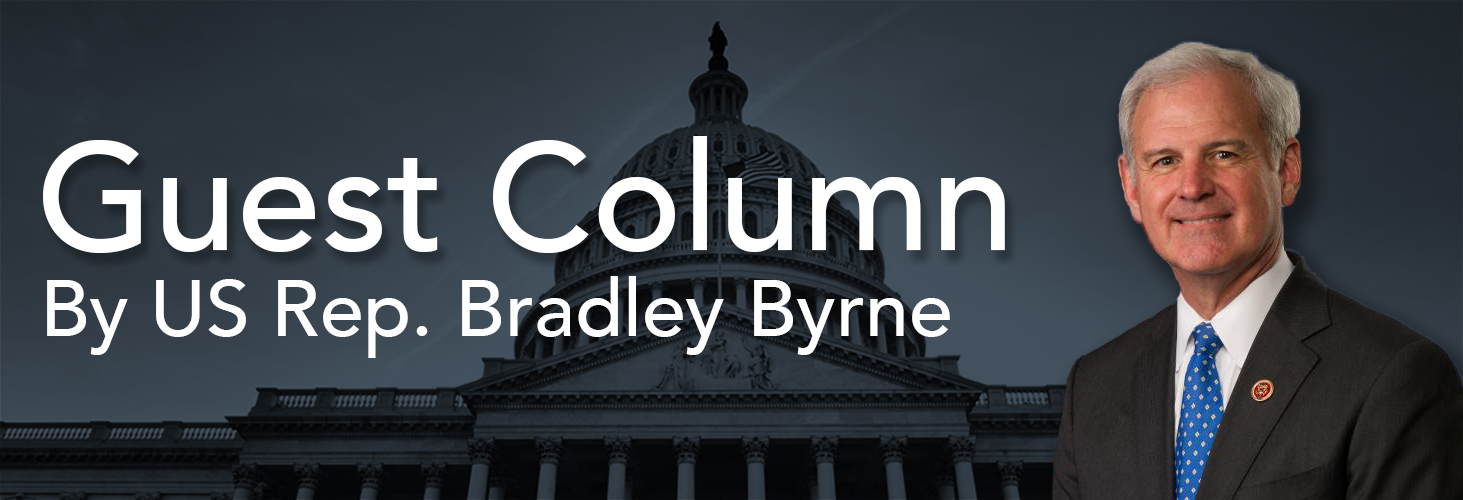By Congressman Bradley Byrne (AL-1)
$1,000,000,000,000. That’s the estimated total cost of regulations issued by the Obama Administration. These regulations have resulted in over 754,000,000 hours of paperwork.
These numbers are pretty remarkable. The wide range of regulations cover everything from energy to agriculture to the environment.
In addition to having a negative effect on all those directly impacted, the regulations have a larger impact by stunting economic growth and increasing costs for consumers across the country. When I talk to Alabama employers, they almost always tell me the cost of regulations issued by the Obama Administration is the top reason they cannot create more jobs.
One of the most frustrating things about most of these government regulations is the fact they are written and pushed out by unelected government bureaucrats. If Congress passes a law that negatively impacts the American people, then they can face repercussions in the next election.
The unelected federal bureaucracies do not face that voter accountability. They can ignore the concerns of the American people because they are not accountable to them. But, for decades, liberal Congresses have given them more and more power. It is a deeply troubling situation.
Thankfully, President-elect Donald Trump has pledged to make regulatory reform one of his top priorities. He has indicated he will remove two regulations for every one new regulation put in place.
In Congress, we must also do our part. We have to take back the power to write the law from those who are unelected, stop the crushing effect of regulation on the economy, and make the regulatory process more open and transparent. And, over the last few weeks, the House has focused on bills to do just that.
One of the very first bills we passed in the new year was the Regulations from the Executive in Need of Scrutiny (REINS) Act. This bill requires both the House and the Senate to vote on any new major rule or regulation before it can take effect. This change would ensure that the elected Congress has the ability to block costly, unnecessary, or illegal regulations.
Last week, the House passed H.R. 5, the Regulatory Accountability Act. This bill puts in place a wide range of regulatory reforms including requiring agencies to choose the lowest-cost option, ensuring greater opportunity for public input and comments, and forcing agencies to publish plain-language, online summaries of new proposed rules. The Regulatory Accountability Act also reverses a Supreme Court decision that remarkably allows federal agencies to interpret what authority Congress has given them.
We also passed the SEC Regulatory Accountability Act this week. The Dodd-Frank Act gave bureaucrats at the Securities and Exchange Commission (SEC) wide power to hand down crushing regulations without adequately considering the impact those regulations have on jobs. This bill would simply require the SEC to confirm that its regulation passes a cost-benefit analysis, meaning its benefits outweigh its cost to our economy.
Sometimes presidents, including President Obama, try and push through a large amount of regulations in the last days of their administration. Often times these rules are rushed and not well considered. In response to this, the House also passed the Midnight Rules Relief Act, which would allow Congress to overturn multiple proposed regulations issued by a lame duck Administration in one bill.
Each of these bills demonstrate our effort to turn the tide away from a heavy-handed federal government back towards the free enterprise principles that empower the American people.



















































